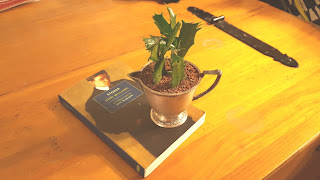Stoner, by John Williams
In the deluge of new books we booksellers are inundated with, it's nice to occasionally step back and read a classic. An upcoming work-related trip prompted me to pick up this well-respected work of American mid-Century fiction, and I enjoyed it immensely. It feels a bit like The Bell Jar, perhaps due to the time in which it was written and the collegiate atmosphere that permeates the two works.
William Stoner is born to a farming family in Missouri and grows up fully expecting to take over the farm once his parents are no longer able to work the meager land. But he gets sent off to college instead, to the newly formed Department of Agriculture. A required sophomore English seminar opens Stoner's eyes to the wonders of literature, and the course of his life is utterly changed. Stoner proceeds to get his degree in literature, then a Master's and finally a PhD., watching his beloved institution weather World War I and the death of a good friend, and eventually World War II. Academically, professionally, Stoner is always more or less fulfilled. He truly loves his field, loves teaching it to others and learning, in turn, from them. Personally, he's stymied time and again.
He marries a woman much younger than he, cold and distant and prone to hysterics. Having no experience of love, the two of them bumble through courtship and honeymoon and prove to be profound disappointments to each other. They have one daughter, a quiet, smart girl who would have thrived under her gentle father's love if not for her vindictive mother. Stoner does eventually find romantic love, but a colleague with an unreasonable vendetta soon ruins it, as well as Stoner's teaching career.
This is a quiet story quietly told; there is no florid language, no sudden scenes of action. It is a life, much like many other lives, full of quotidian joys and sorrows, and the larger events that shape us again, and again, and again, proving that we are never the same person as we were the day before, even while we retain the core of our being. It is a sad story, ultimately, though not an entirely unhopeful one.

William Stoner is born to a farming family in Missouri and grows up fully expecting to take over the farm once his parents are no longer able to work the meager land. But he gets sent off to college instead, to the newly formed Department of Agriculture. A required sophomore English seminar opens Stoner's eyes to the wonders of literature, and the course of his life is utterly changed. Stoner proceeds to get his degree in literature, then a Master's and finally a PhD., watching his beloved institution weather World War I and the death of a good friend, and eventually World War II. Academically, professionally, Stoner is always more or less fulfilled. He truly loves his field, loves teaching it to others and learning, in turn, from them. Personally, he's stymied time and again.
He marries a woman much younger than he, cold and distant and prone to hysterics. Having no experience of love, the two of them bumble through courtship and honeymoon and prove to be profound disappointments to each other. They have one daughter, a quiet, smart girl who would have thrived under her gentle father's love if not for her vindictive mother. Stoner does eventually find romantic love, but a colleague with an unreasonable vendetta soon ruins it, as well as Stoner's teaching career.
This is a quiet story quietly told; there is no florid language, no sudden scenes of action. It is a life, much like many other lives, full of quotidian joys and sorrows, and the larger events that shape us again, and again, and again, proving that we are never the same person as we were the day before, even while we retain the core of our being. It is a sad story, ultimately, though not an entirely unhopeful one.


Comments
Post a Comment